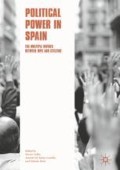Abstract
In this chapter, the functioning of parliamentary groups is analyzed. In the Spanish case, it has been found that there is high parliamentary discipline, which is supported by the members of all the parties and parliaments, as well as by citizens. However, this does not necessarily translate into a vertical functioning of the parliamentary groups. The parliamentary groups are headed by the veterans within the group, but the mere fact of holding a position in the party does not have a significant effect on the degree of influence in the parliamentary group. In general terms, the power of the parliamentary groups is concentrated in the professional politicians who have developed their career within the parties, preventing professionals from other fields from accessing positions of power. At the same time, women have fewer probabilities than men of accessing positions of leadership in the parliamentary groups.
Access this chapter
Tax calculation will be finalised at checkout
Purchases are for personal use only
Notes
- 1.
Some authors, however, distinguish between party cohesion and party discipline . Cohesion would refer to the “majority direction of the vote of a parliamentary fraction and to the percentage of legislators that are removed from this”. Party discipline would refer to “legislators’ compliance with the stance of the party leader or the parliamentary fraction” (Casar 2000, p. 196).
- 2.
For a more in-depth analysis of the subject see chapter 5 “Recruitment and selection”.
- 3.
The Constitutional Court Judgement (STC) 5/1983, of 4 February, states that “the representatives give effectiveness to the right of citizens to participate and not that of any organisation such as the political party”, adding that “the right to participate corresponds to the citizens, and not to the parties; that the representatives elected are representatives of the citizens and not of the parties…”. Likewise, the STC 10/1983, of 21 February, warns that the function constitutionally attributed to parties is that of “acting as an essential channel” and expressly rejects, contrary to the Constitution, the theory that the parties and not the candidates are those who receive the mandate from voters, stating that the representatives represent “the whole electoral body”, without parties being able to end this relationship between representatives and the electoral body. For an analysis of this subject see Santaolalla (1986).
- 4.
This variable takes the value of 0 for those MPs who state that they did not have a career before entering politics.
- 5.
In chapter 5, “Recruitment and selection” the relation between organic positions in the parties and the creation of electoral lists is analyzed.
References
Caballero, G. (2006). La economía política de la organización industrial del Congreso de los Diputados en España. Derechos de propiedad, transacciones y jerarquías. Trimestre Económico, 291, 637–666.
Caballero, G. (2007). Comisiones, grupos parlamentarios y diputados en la gobernanza del Congreso de los Diputados. Revista de Estudios Políticos, 135, 67–107.
Casar, M. A. (2000). Coaliciones y cohesión partidista en un gobierno sin mayoría: la Cámara de Diputados de México, 1997–1999. Política y Gobierno, 7(1), 183–202.
Coller, X., Jaime-Castillo, A. M., & Santana, A. (2012, July). What Makes Political Elites Survive in Parliaments? Circulation and Professionalization of Elites. Paper Presented at the 22nd World Congress International Political Science Association, Madrid.
Duverger, M. (1964). Political Parties. London: Methuen.
Eguia, J. X. (2011). Voting Blocs, Party Discipline and Party Formation. Games and Economic Behavior, 73(1), 111–135.
Epstein, L. D. (1980). Political Parties in Western Democracies. New Brunswick: Transaction Books.
Fenno, R. F. (1978). Home Style: House Members in Their Districts. Boston: Little, Brown and Company.
Hirshman, A. O. (1970). Exit, Voice and Loyalty. Cambridge: Harvard University Press.
Jaime, A. M., & Martínez-Cousinou, A. M. (2013). Grupos parlamentarios y contexto institucional. In X. Coller & A. M. Jaime (Eds.), El perfil del poder: Radiografía de los parlamentarios andaluces (2008–2012) (pp. 99–122). Sevilla: Parlamento de Andalucía.
Janda, K. (1980). Political Parties: A Cross-National Survey. New York: Free Press.
Kam, C. J. (2009). Party Discipline and Parliamentary Politics. Cambridge: Cambridge University Press.
Maor, M. (1997). Political Parties and Party Systems. Comparative Approaches and the British Experience. London: Routledge.
Sánchez de Dios, M. (1996). La disciplina de partido en los grupos parlamentarios del Congreso de los Diputados. Revista de las Cortes generales, 39, 183–210.
Sánchez de Dios, M. (1999). Parliamentary Party Discipline in Spain. In S. Bowler, D. M. Farrel, & R. S. Katz (Eds.), Party Discipline and Parliamentary Government (pp. 141–167). Columbus: Ohio State University Press.
Sánchez de Dios, M. (2005). La actividad de las Cortes Generales entre 1979 y 2000 desde la perspectiva del Gobierno de partido. Política y Sociedad, 42(1), 227–255.
Santaolalla, F. (1986). Problemas jurídico-políticos del voto bloqueado. Revista de Estudios Políticos, 53, 29–43.
Sartori, G. (1994). Comparative Constitutional Engineering. An Inquiry into Structures, Incentives and Outcomes. New York: New York University Press.
Zariski, R. (1960). Party Factions and Comparative Politics: Some Preliminary Observations. Midwest Journal of Political Science, 4(1), 27–51.
Author information
Authors and Affiliations
Editor information
Editors and Affiliations
Rights and permissions
Copyright information
© 2018 The Author(s)
About this chapter
Cite this chapter
Jaime-Castillo, A.M., Martínez-Cousinou, G. (2018). Parliamentary Groups and Institutional Context. In: Coller, X., Jaime-Castillo, A., Mota, F. (eds) Political Power in Spain. Palgrave Macmillan, Cham. https://doi.org/10.1007/978-3-319-63826-3_7
Download citation
DOI: https://doi.org/10.1007/978-3-319-63826-3_7
Published:
Publisher Name: Palgrave Macmillan, Cham
Print ISBN: 978-3-319-63825-6
Online ISBN: 978-3-319-63826-3
eBook Packages: Political Science and International StudiesPolitical Science and International Studies (R0)

